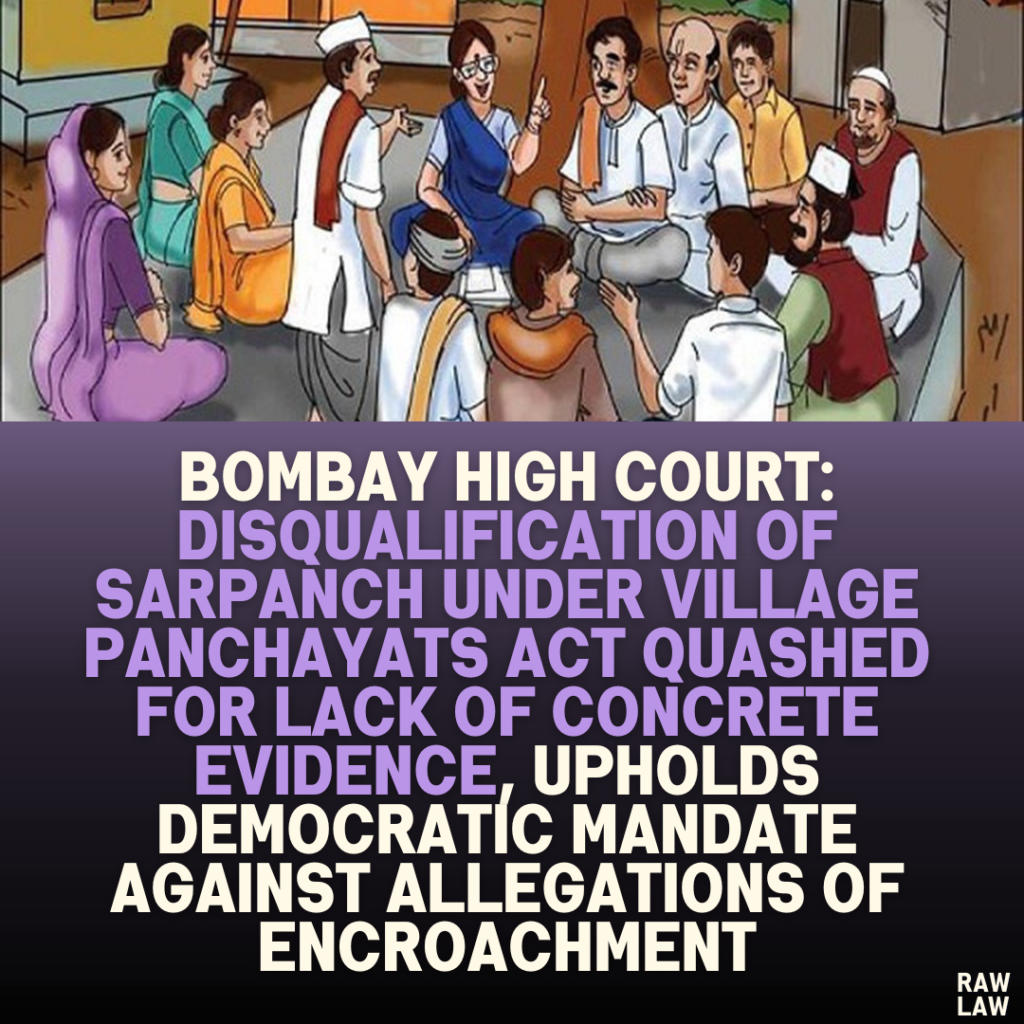Court’s Decision:
The Bombay High Court dismissed a writ petition challenging an Additional Divisional Commissioner’s order, which had overturned the Collector’s decision disqualifying a Sarpanch under Section 14(1)(j-3) of the Maharashtra Village Panchayats Act, 1958. The court held that concrete evidence is mandatory for disqualification, and decisions cannot be based on suspicion or conjecture.
Detailed Breakdown:
Facts:
- Background:
- The respondent was elected as a member of the Grampanchayat and subsequently as the Sarpanch of Village Korochi, Kolhapur.
- The petitioners alleged that the respondent’s mother had encroached on government land and built a residential house there, which disqualified the respondent under Section 14(1)(j-3) of the Village Panchayats Act.
- Dispute:
- The petitioners filed a Dispute Application before the Collector, alleging that the respondent resided in the house constructed by his mother on government land.
- The Collector disqualified the respondent, citing encroachment.
- Appeal:
- The respondent appealed to the Additional Divisional Commissioner, who set aside the Collector’s decision, stating that the evidence was insufficient to prove encroachment.
- The petitioners challenged this order before the Bombay High Court.
Issues:
- Does the respondent’s mother’s house constructed on government land under the National Rural Employment Programme (NREP) amount to encroachment?
- Can the respondent, residing with his mother in the same house, be disqualified under Section 14(1)(j-3)?
Petitioners’ Arguments:
- Encroachment Allegations:
- The respondent’s mother built her house on government land, and the respondent resided there, making him complicit in the encroachment.
- Fabricated Evidence:
- The rent agreement submitted by the respondent to prove he lived elsewhere was fabricated and executed just before elections.
- Misuse of Government Records:
- The respondent allegedly created false entries in the Grampanchayat records to show his mother as a beneficiary of the NREP scheme, despite claims that no such scheme was implemented in Korochi.
Respondent’s Arguments:
- Housing Scheme:
- The house in question was constructed under the NREP, a government scheme that provides land to landless laborers.
- The respondent’s mother was a beneficiary of this scheme, as confirmed by the Circle Officer’s report.
- Lack of Evidence:
- The petitioners failed to produce concrete evidence linking the respondent to any encroachment.
- Democratic Rights:
- The respondent is a democratically elected representative, and disqualification cannot be based on mere conjecture.
Analysis of the Law:
- Section 14(1)(j-3):
- This provision mandates disqualification for encroachment on government land but requires clear and unambiguous proof.
- Encroachment must be definitively linked to the individual for disqualification to apply.
- Burden of Proof:
- Disqualification has severe consequences, including removal from office and a ban on future elections.
- The law demands strict procedural adherence and conclusive evidence, given the punitive nature of disqualification.
Precedent Analysis:
- Janabai v. Additional Commissioner:
- Encroachment by family members can lead to disqualification if there is substantial evidence.
- Ravi Yashwant Bhoir v. District Collector Raigad:
- Disqualification requires strict proof, and suspicion or conjecture is insufficient.
- Sunil Dinkar Jagdale v. State of Maharashtra:
- Houses built under government housing schemes are not automatically considered encroachments unless proven otherwise.
- Yogesh Shriram Solanke v. Divisional Commissioner:
- Construction under schemes like Indira Awas Yojana cannot constitute encroachment for disqualification purposes.
Court’s Reasoning:
- Assessment of Evidence:
- The Circle Officer’s report confirmed that the respondent’s mother’s house was constructed under the NREP scheme in 1984.
- Entries in the Grampanchayat’s records supported this finding.
- The petitioners relied on conjecture rather than definitive proof to link the respondent to encroachment.
- Democratic Process:
- The court emphasized the importance of protecting the democratic mandate of elected representatives.
- Disqualification cannot be ordered without conclusive findings, as it disrupts the electorate’s choice.
- Strict Interpretation:
- Disqualification is a severe measure, and the law must be interpreted strictly to ensure fairness.
- Any ambiguity in evidence must favor the elected representative.
Conclusion:
- The Bombay High Court dismissed the petition, affirming the Additional Divisional Commissioner’s decision to set aside the Collector’s disqualification order.
- It ruled that the evidence presented was insufficient to establish encroachment, and the respondent’s democratic rights must be upheld.
Implications:
- This judgment reinforces that allegations of encroachment against elected officials must be backed by concrete evidence.
- It underscores the importance of safeguarding democratic processes and ensuring that disqualifications are not misused as a tool for political vendettas.
- The decision serves as a precedent for interpreting disqualification provisions with strict procedural adherence and factual scrutiny.




Pingback: Bombay High Court Dismisses Objections to Amendment in Partition Suit, Upholds Inclusion of Lessees as Essential for Comprehensive Adjudication to Resolve Lease Agreements Impacting Ancestral Property Claims - Raw Law